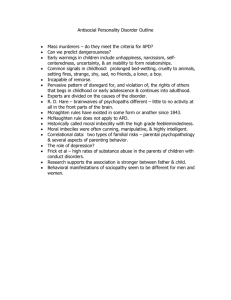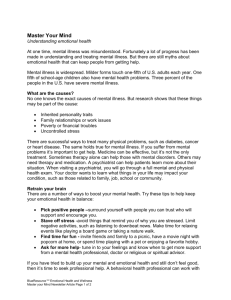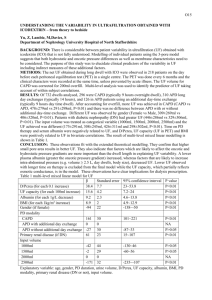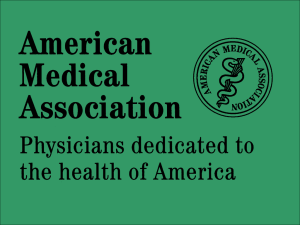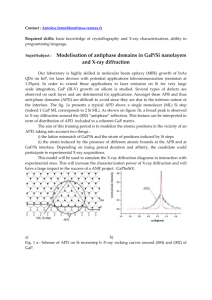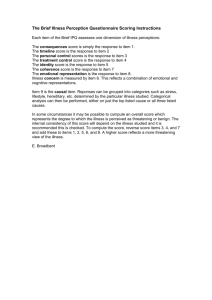(projdoc).
advertisement
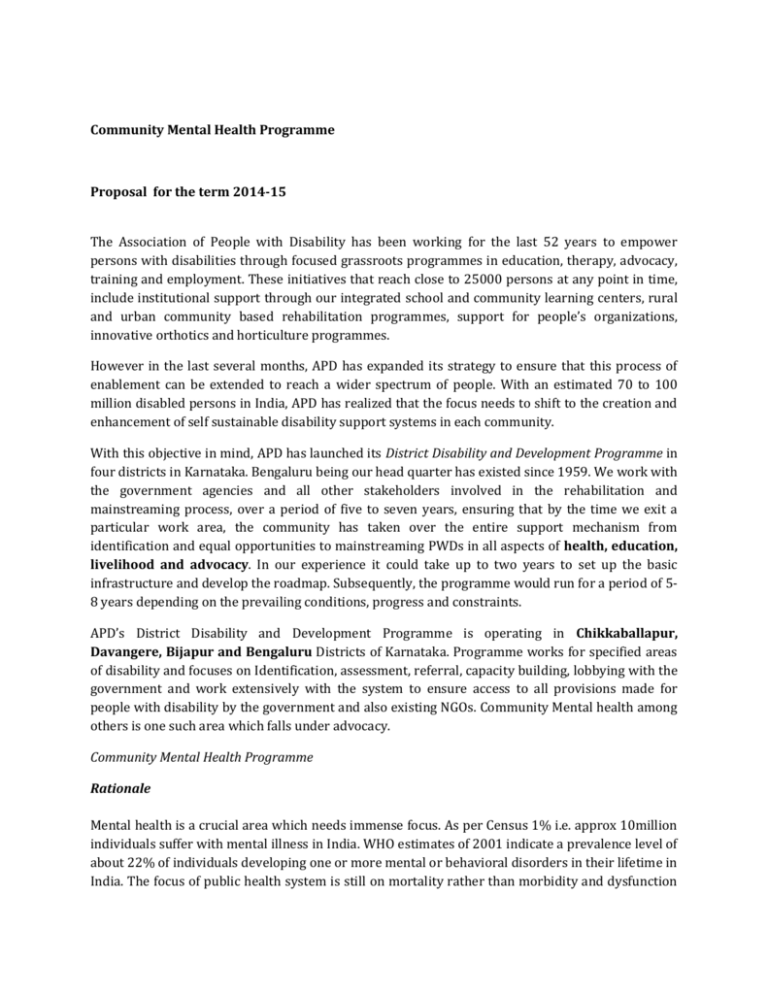
Community Mental Health Programme Proposal for the term 2014-15 The Association of People with Disability has been working for the last 52 years to empower persons with disabilities through focused grassroots programmes in education, therapy, advocacy, training and employment. These initiatives that reach close to 25000 persons at any point in time, include institutional support through our integrated school and community learning centers, rural and urban community based rehabilitation programmes, support for people’s organizations, innovative orthotics and horticulture programmes. However in the last several months, APD has expanded its strategy to ensure that this process of enablement can be extended to reach a wider spectrum of people. With an estimated 70 to 100 million disabled persons in India, APD has realized that the focus needs to shift to the creation and enhancement of self sustainable disability support systems in each community. With this objective in mind, APD has launched its District Disability and Development Programme in four districts in Karnataka. Bengaluru being our head quarter has existed since 1959. We work with the government agencies and all other stakeholders involved in the rehabilitation and mainstreaming process, over a period of five to seven years, ensuring that by the time we exit a particular work area, the community has taken over the entire support mechanism from identification and equal opportunities to mainstreaming PWDs in all aspects of health, education, livelihood and advocacy. In our experience it could take up to two years to set up the basic infrastructure and develop the roadmap. Subsequently, the programme would run for a period of 58 years depending on the prevailing conditions, progress and constraints. APD’s District Disability and Development Programme is operating in Chikkaballapur, Davangere, Bijapur and Bengaluru Districts of Karnataka. Programme works for specified areas of disability and focuses on Identification, assessment, referral, capacity building, lobbying with the government and work extensively with the system to ensure access to all provisions made for people with disability by the government and also existing NGOs. Community Mental health among others is one such area which falls under advocacy. Community Mental Health Programme Rationale Mental health is a crucial area which needs immense focus. As per Census 1% i.e. approx 10million individuals suffer with mental illness in India. WHO estimates of 2001 indicate a prevalence level of about 22% of individuals developing one or more mental or behavioral disorders in their lifetime in India. The focus of public health system is still on mortality rather than morbidity and dysfunction which are increasing prevalence of disabilities in India. Health care system at large is falling behind on catering to the mental health needs of the people. Mental illness is still a cornered subject in India. There is still stigma around the disease and can be observed in the attitude and behavior of the people in general which is also due to lack of awareness among them about mental illnesses. In the rural and urban areas, the lower socio-economic tier, Persons with mental illness are most neglected. There is no access to health and with no early identification illness reaches its severity with no timely treatment. Due to lack of awareness about mental health leads to ill-treatment or resorting to traditional superstitious ways which in-turn leads to worsening of the condition of the person with mental illness. Specific Objectives To create awareness extensively in communities about mental health, causes, treatment and availability. To ensure access to treatment through psychological services, medical services, counseling and follow up services under DMHP To ensure lobbying for budget allocation for mental health services To support and train caregivers To enable access to livelihood opportunities To ensure social integration About the beneficiaries Disadvantaged economic background Backward rural and urban slum dwellers Aged between 16-35 years Backward castes and religious minorities Mostly educated only up to 12th, 10th grade or less. Sometimes un educated APD and Community Mental Health Programme In APD's experience we have seen that people with mental illness have hardly received treatment, they are overwhelmed with the sense of helplessness & hopelessness. Only district hospitals and few hospitals in metropolitan cater to the needs of mental illness. There are hardly any psychologists and psychiatrists in any primary health care centers. It is also found that there are no sufficient scheduled drugs in stocks at any of the government health care centers. The people with poor socio-economic background cannot afford to buy medicines on their own. It is imperative that the public health system focuses on mental health and considers it equally important as any other. Those medical services are to be made available at all the health centers. It is also very important for creating extensive awareness on mental illnesses and available treatments. People in general do not have idea as to where they could access for free or subsidized treatments as well. Our pilot studies and initial attempt to work for people with mental illness (PWMI) brought us to realization that there is need for District Mental Health Program (DMHP) across the state. APD understands the need for awareness on mental illnesses among children and plans to design a model that caters to the need of children with mental illness. This is indeed an untouched significant matter in India and needs enormous focus. APD initiated its community mental health program in the year 2004 when there was just one Hospital in Bengaluru that catered to issues with mental health of the public. APD believed that all PWMI should have opportunity to exercise their basic rights, should be able to lead a normal life with social integration. Not lose their family and be able to lead an independent life. Since then there was a movement that occurred in the state to spread awareness and strengthen the facilities for PWMI. Few other NGOS as well joined this movement and now we can see nearly 5 major hospitals providing various services and strengthening existing services. We have been able to guide and support psychiatrists to conduct camps in Kolar which was not the case earlier. APD’s fellowship program initiated in last year gives opportunity to people from grassroots to become the catalyst of change in field of mental health. Awareness among our work areas is increasing through structured a program that involves mediums like wall writing, street plays, public Medias, posters etc and as a result number of referrals to APD is also increasing. APD has also partnered with other NGOs to strengthen the federation in Bengaluru who now make the voice demanding for their rights. Almost 550 federation members (PWMI & Caregivers) run the movement with minimal support from NGOs. Among which total identified by APD is 160. However there is immense need for the services to reach rural Taluks and all PHCs in order to ensure timely access to the mental health. Current services reach only a few hundreds in Bengaluru and other districts centers. In order to bring in place an effective system that caters to needs of PWMI a comprehensive road map is built through our experience and our initial studies in districts in the past years. Presently we have identified 501 PWMIs and with this experience, now we have deployed staff in all four districts and completed survey during the previous year, based on the data available we expect to work with 910 new persons. Case example of Malur: Persons with mental illness in Malur Taluk had to travel all the way to Kolar or Bengaluru for treatment. This issue was raised in the caregiver’s federation meeting and a request was submitted to the state health Director. The director recommended that the psychologist in Kolar could visit Malur Taluk hospital once in a month to treat local PWMIs. So far 120 persons have benefited from this arrangement. Implementation strategy Community Mental health Programme involves extensive awareness creation among target community. This is done through well structured exhibitions and other mass awareness programs. Various mediums are used during awareness program to ensure effective communication about the subject. Awareness is also imperative among government officials, Doctors, Psychologists, teachers, children etc. For this purpose planned workshops are arranged for target groups in every Taluk in schools, district hospitals etc to ensure balanced conceptualization and understanding of mental health needs. Awareness of such program leads to Identification of individuals with mental Illness who will then be assisted with further access of services through referrals and follow up mechanism. Assessed PWMI receives medical and psychological attention from professionals in hospitals, counseling for the PWMI, caregivers and other family members is considered crucial in many cases and support for same is provided through referrals or in-house programs and normal social integration is ensured. Follow up support is also initiated to prevent any re-lapse. Federations are then formed among the PWMI and their caregivers who are further enabled to lobby with the system and demand for their rights with minimal help from APD. Promoting leadership among the PWMIs who will lead federations and take up issues with various government agencies. With federation as the face of PWMIs further lobbying with the government to make policy level changes creating budget allocation for PWMI, introduction of DMHP across four districts and ensuring effective access to counseling, Psychological and psychiatric services, medicines etc. Capacity building of PWMI and Caregivers through residential camps and training programs Support in getting access to livelihood opportunities, once stability gained by individuals, through extensive training, vocational training and materials. Plan For the term 2012-13 Over all 910 PWMIs who are identified presently through survey will be supported through awareness programs in four districts and total follow up of 501 PWMIs will be done from last year. Ward level federations will be formed in 5 wards in Bengaluru and capacity building training will be conducted for members including federations in 6 Taluks among rest of the districts on various occasions Capacity building program will be conducted for at least one disabled people’s organization and one NGO in each district Workshops will be conducted among other stakeholders such as doctors, schools, police, lawyers, government officials, psychologists, counselors, students etc on various occasions Residential camp for selected PWMIs and caregivers with livelihood support Treatment referrals are ensured to all the persons and follow up’s are ensured to minimum 70% for ensuring medication and counseling. 800 PWMI will be rehabilitated psychologically and socially and out of this Livlihood opportunities are ensured to 300 persons either through sending them to previous jobs or finding new avenues. Needy persons are provided assistance in buying medicines where ever government systems do not have required drugs. Training for in-house staff for up-to-date and right knowledge related to mental health Training materials, hand books and posters on mental health will be developed Develop training material on children with mental illness encompassing causes, treatment and support The program plan meets the strategic need of initial awareness, building capacities, promoting leadership during the current years laying strong foundation to further building capacities of PWMI, government officials, NGOs, DPOs and other stakeholders. There will exist a strong networking and synergy among PWMIs. BUDGET FOR THE PROJECT. Sl. no. Activities Budget break -up A PROGRAMME EXPENSES 1 Community awareness programmes in each district a. Local Awareness programs Rs3500X12 programs = 42000 stalls, hand bills, Banners, hand books b. Wall writings- 12 Rs2500X12 programs=30000 c. Hand bills Printing Rs 40000 12,000copies d. World mental Health Day Banners, Placards, Hand bills, Food & one rally programme in 4 Travels district Rs 67X150 persons = Rs10050 per district for 4 districts 2 Health and support services to identified Person with Mental Illness a. Medical Intervention support Local travel-50 persons XRs 200X5 -200 PWMIs months = 50,000 Medicine-150 X100 persons X5 months=Rs75000 b. Residential camp for PWMIs Food, Accommodation, material and & care givers. Six Camps resource person cost 35 persons X Rs 300X3 days= 31500 per camp for 6 camps c. Mental health Rs.6000 x12 months persons professionals, resource persons and consultant charges ( Honorarium & travel cost) 3 Federation Support Total Amount (INR) 112,000 40,200 125,000 189,000 72,000 a. b. a. b. c. Federation meetings -36 Capacity building for Federation members 4 Capacity building Doctors training programs-04 Link workers/Asha/ANMs-8 Support for vocational training / livelihood 5 Staff Training & exposure visits. 6 Training Materials Rs20X40 persons X36 meetings 35 persons XRs 300X3 days X6progs 189,000 60 persons XRs100X4progs 60 persons XRs100X8progs 30 persons X 5000 b. c. B Program Manager part salary Coordinator Overheads 1 Staff Travel -07 2 Printing &Stationery 3 Postage & telephone 4 General expenses Grand Total 24,000 48,000 1,50,000 Food, Travel & Accommodation. 10,000 Posters Printing (Rs 15x3000 nos.) 7 Salaries a. 3 Sr. mental health workers, 4 JR. Mental Health, health worker, 28800 Rs.8000x3 personsx12 months = Rs 288000 Rs 6000x4 persons x12months= Rs 288000 Rs 8000X12months Rs12500X12 months 45,000 576,000 96,000 150,000 Rs 1000X7staff membersX12 months Rs 500X12months X4district Rs 1000X12months X4district 84,000 24,000 48,000 11,500 Rs 20,22,500/- a) Evaluation pattern. Three components that act as indicators will be used for evaluating process of the project. Such as: Contact initiated by beneficiaries as post awareness queries No. of PWMI identified and assessed Formation and functioning of federations, no of cases raised as issues with govt Orders issued by government, policy changes etc Access to Livelihood opportunities Caregivers training and follow ups Printing materials required All the above will be captured in monthly reports, quarterly reports and yearly reports. Review meeting will also be held periodically of which minutes are maintained 1. Transportation cost to take PWMI to for treatment to hospitals and training programs for five months Rs 1000/2. Food and accommodation charges during residential training programs Rs 900/3. Campaigns on mental health awareness 4. Medical Intervention support for 10 person with mental illness for a year Rs 7500 5. Mental Health Trainer’s cost Rs 72000 6. Staff salary cost for one year 52000 (4500 per month) 7. Training materials for one year 45000 8. Any Amount
